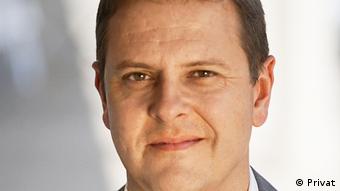Conspiracies are 'always theories of power'
Whether it's Area 51, the moon landing or the 9/11 attacks, it feels like a disproportionate amount of conspiracy theories have something to do with the US. Expert Michael Butter says that's not quite true.

DW: So many conspiracy theories seem to have their origin in the United States. Why?
Michael Butter: To a certain degree, this is a misperception. There are tons of conspiracy theories in eastern Europe, and also in central Europe, that also have their origins [in those locations], even though the US tends to play a big role in them. And this is, I think, because conspiracy theories are always also theories of power. If you look at the period after the Second World War, the US has clearly been the most powerful country in the world. And, therefore, those who are investigating who is really responsible, who is benefiting from that, inevitably end up pointing their finger at the US. No matter if they’re located inside or outside that country.
What’s your favorite German conspiracy theory?
When it comes to Germany, I must admit I don’t really have a favorite conspiracy theory. Because the popular, influential German conspiracy theories all had horrible consequences. Think of the conspiracy theory of a Jewish plot to dominate the world that basically led to the Holocaust. Or think of the Great Replacement theory that is currently so popular. I actually prefer the moon landing conspiracy theory because it’s so extremely convincing at first sight, and second, because nobody, to the best of my knowledge, has ever done any harm to anybody because of it.

Michael Butter is helping coordinate EU conspiracy theory research
And the Great Replacement theory would be the replacement of the current dominant ethnic groups through immigration?
Exactly. In Europe it’s usually about the replacement of the Christian population of Europe through a Muslim population by way of orchestrated migration. But for example, the El Paso shooter a couple of weeks ago also referred to the Great Replacement theory in his manifesto, and for him, it was clearly the replacement of US citizens through Mexicans. So there, you see there are always certain national variations.
What are some conspiracy theories that are unique, or special, to Europe?
It’s very difficult to say if they’re unique or special to Europe. We do of course have certain conspiracy theories in Poland, for example, about the plane crash of the former president in Smolensk. That blames Russia for orchestrating that plane crash. That would be a very specifically national conspiracy theory. What we usually have are conspiracy theories that circulate on a global scale, but nevertheless have certain national variations. So for example, the Great Replacement theory looks different in Hungary than in Poland, Germany, or the United States.

Conspiracy theorists in Berlin warn others of airplane "chemtrails," which they claim contain behavior-changing chemicals
You're one of about 150 people involved in something that’s happening at the EU level called the Comparative Analysis of Conspiracy Theories. Nearly 40 countries are involved, and a dozen disciplines are represented. What are you doing there?
One goal was to actually synchronize the research on that topic, so that people don’t have to reinvent the wheel the whole time. Because, of course, nobody can research in Albanian, Polish, Czech, English, French, German, Italian, et cetera. So you bring these people together so that they talk to teach other in English. We’re currently editing a big handbook of conspiracy theories that will be state of the art. The other aim is to develop new research questions - to come up with comparative and transnational projects that, for example, trace exactly those transformations. So the Great Replacement theory that we talked about. And third, and finally, the goal is also to produce recommendations for stakeholders - for policymakers, for educators, for people concerned with the public communication of science that are more and more faced with conspiracy allegations in their daily work.
Michael Butter is the vice chair of the EU’s Comparative Analysis of Conspiracy Theories action group. He’s also the author of a number of books on conspiracy theories and is a professor of American Literary and Cultural History at the University of Tübingen in Germany.
- Date 20.09.2019
- Author Conor Dillon, Gabriel Borrud
- Related Subjects White House
- Keywords conspiracies, Area 51, 9/11, moon landing, European conspiracy theories, Power, United States
- Permalink https://p.dw.com/p/3PnK3
No comments:
Post a Comment